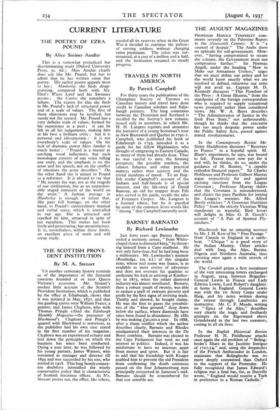THE AUGUST MAGAZINES
PROFESSOR HAROLD TEMPERLEY com- ments severely on the Palestine Report in the Nineteenth Century. It is " a counsel of despair." The Arabs show no aptitude for self-government. How- ever, " having compromised to secure the scheme, the Government must not compromise further." Sir Norman Angell, under the . heading " How to Make our Armament Useless," urges that we must define our policy and let the world know exactly what we are resolved to defend, otherwise our arms will not avail us. Captain M. D. Kennedy discusses " This Freedom of the Press : A Great Illusion," from the standpoint of the foreign correspondent who is required to supply sensational news promptly rather than considered views. Mr. W. A. Beers describes " The Administration of Justice in the Irish Free State," not unfavourably, though he thinks that the executive has too much despotic power under the Public Safety Acts, passed against armed revolutionaries.
In the Contemporary Review Mr. Sisley Huddleston discusses " Recovery in France " in a hopeful spirit. M. Blum's experiment, he says, was bound to fail. France must now pay for it and will, he thinks, do so, under the guidance of M. Bonnet, " a capable orthodox financial expert." Sir Charles Hobhouse and Professor Gilbert Murray argue respectively for and against excising sanctions from the • League Covenant ; Professor • Murray thinks that the Covenant is misunderstood, and chides the pure Pacifists for joining the League's enemies. Mr. Alfred Beesly criticises " A Generous Nutrition Policy " from the strictly Victorian Whig standpoint as wasteful. Bird lovers will delight in Miss G. B. Gooch's account of " A Pair of Spotted Fly- catchers."
Blackwoods has an amusing account by Mr. I. H. Kerr of his " Free Passage " from Canada to England in a cattle- boat. " Ubique " is a good story of the Indian Mutiny. Other articles deal with Iraq, the Alps, Burma, Nigeria and Northern Australia, thus covering once again a wide stretch of the world.
The Cornhill prints a first instalment of the very interesting letters exchanged in August, 1914, between Brigadier- General Lewin in France and Lady Edwina Lewin, Lord Robert's daughter, at home in England. General Lewin was with the ist Army Corps under Haig, and his notes written during the retreat through Landrecies are instructive. Mr. C. F. Meade, writing on " Epics of the Alps," describes very dearly the tragic and foolhardy attempts on the Eigerwand above Grindelwald in the last two summers, costing in all six lives.
In the English Historical Review Professor H. N. Fieldhouse attacks once again the old problem of Boling- broke's Share in the Jacobite Intrigue of 171 0-14," and, using the despatches of the French Ambassador in London, maintains that Bolingbroke was no more deeply committed, than Oxford to the support of the Pretender. He fully recognised that James Edward's religion was a fatal -bar, for, as Iberville wrote, " England would receive a Turk in preference to a Roman Catholic."






































 Previous page
Previous page